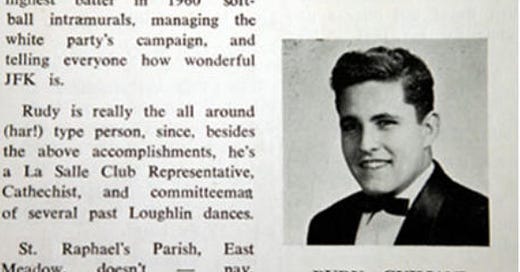This review of Andrew Kirtzman’s new biography of Rudolph Giuliani was published earlier this month in the Times Literary Supplement, a few days before the death of Queen Elizabeth II. One parenthetical line cut by the TLS editors has been restored in this version.
One explanation for the zombie-like dominance of the baby-boom generation in American politics might be that, in the past decade, the US media ecosystem has ceased to be capable of minting nationally viable celebrity politicians. Barack Obama could be the last of his kind: a charismatic and telegenic politician known to the nation on his own terms before he could be chopped down by a thousand memes. Donald Trump, Hillary Clinton and Joe Biden have all been national figures for at least four decades. They are elderly, but we knew them when they were young. They may be doddering figures now, but they are permanent. Their renown was forged at a time when the broadcast television networks could conjure up something like a national consensus. The same cannot be said for Pete Buttigieg, Beto O’Rourke or Marco Rubio. Of the younger generation, only Alexandria Ocasio-Cortez has come close to the old level of fame, largely because the right finds her a convenient figure to vilify. Anyone who emerges on the scene in the era of Twitter is instantly subject to polarization as saint or demon.
Rudolph Giuliani comes from a more innocent time. Known as a law-and-order figure, and a genial if slightly wooden joke-cracker, during his tenure as mayor of New York City in the 1990s, when he was making cameos on Seinfeld, he burst into full fame after the attacks of September 11, 2001, when the nation and its television networks needed a hero. His presence and eloquence at the scene of the crime were at least sufficient, and, for many, much more than that. Andrew Kirtzman’s new biography, Giuliani: The rise and tragic fall of America’s mayor, inscribes its thesis in its subtitle. The notion is that Giuliani was once truly glorious, and that his subsequent association with Trump, whom he has served in recent years as a personal lawyer and media surrogate, constitutes a betrayal of the legacy he set down as the leader of New York during one of its greatest crises.
Kirtzman, who covered Giuliani as a reporter for the NY1 television station throughout his mayoralty (1994-2001) and shadowed him on the day the Twin Towers were toppled, is committed to the idea that his subject was once genuinely heroic. (His earlier biography was entitled Rudy Giuliani: Emperor of the city, 2000; revised 2001.) But another story can be gleaned from this thoroughly reported and generally well-told book. Since he was a boy running student political campaigns, through his time as a local and federal prosecutor, and up to the present, Giuliani has always loved action and attention. Thus, the mere maintenance of his national profile during the Trump regime and its seedy aftermath has constituted a victory, whatever perceived vicissitudes have accompanied it. And who is doing the perceiving? The corrupt liberal media? Irrelevant. And who will be doing the remembering? As Giuliani told one interviewer, “Legacies don’t matter. I’ll be dead”.


